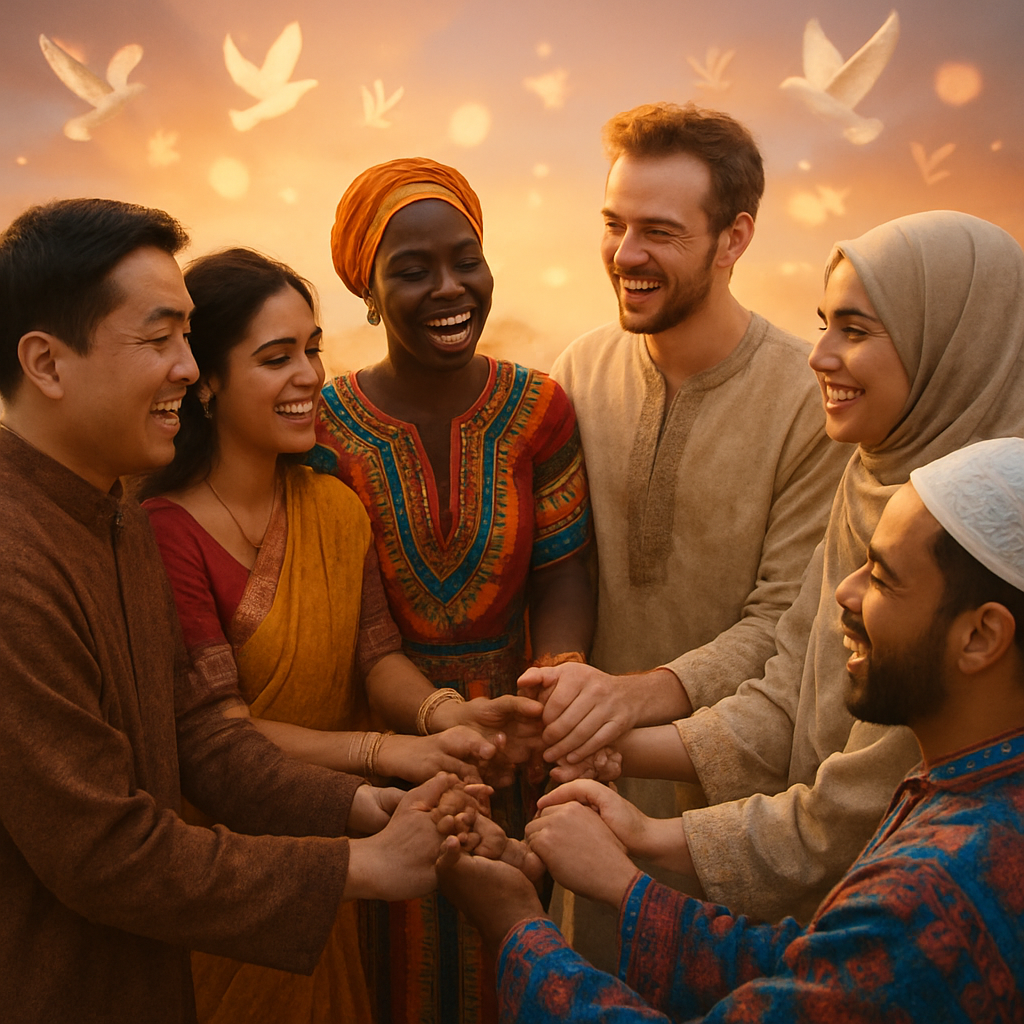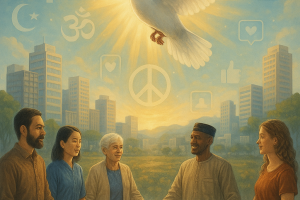International Day of Friendship: Building Global Peace Through Unity

International Day of Friendship: Fostering Global Peace and Understanding
In an era marked by global tensions and social divides, the International Day of Friendship stands as a beacon of hope, reminding us of the transformative power of human connection. Observed annually on , this day celebrates the universal bond of friendship as a catalyst for peace, unity, and cross-cultural understanding. As we delve into the significance of this observance, we’ll explore how friendship transcends borders, cultures, and differences to create a more harmonious world.
The Genesis and Evolution of International Day of Friendship
The roots of International Day of Friendship stretch back to 1958 when Dr. Ramon Artemio Bracho, along with his friends in Paraguay, proposed the idea of a World Friendship Crusade. Their vision was simple yet profound: to promote friendship globally, irrespective of race, color, or religion. This grassroots movement laid the foundation for what would later become a globally recognized day.
In 2011, the United Nations General Assembly took a significant step by officially proclaiming July 30 as the International Day of Friendship. This decision elevated the concept from a local initiative to a global observance, aligning it with the UN’s mission to foster dialogue among civilizations, solidarity, and mutual understanding.
The evolution of this day reflects a growing recognition of friendship’s role in addressing global challenges. From its humble beginnings to its current status as a UN-recognized observance, International Day of Friendship has become a powerful tool for promoting peace and social cohesion.
The Multifaceted Impact of Friendship on Society
Friendship, at its core, is a universal human experience that transcends geographical and cultural boundaries. The International Day of Friendship serves as a reminder of this shared experience and its potential to effect positive change on both individual and societal levels.
Friendship as a Catalyst for Social Change
Research has consistently shown that strong social bonds contribute to individual well-being and community resilience. A study published in the Journal of Happiness Studies found that individuals with strong friendships reported higher levels of life satisfaction and were more likely to engage in prosocial behaviors.
Dr. Emma Thompson, a social psychologist at the University of Cambridge, notes, “Friendships act as a buffer against stress and adversity. They provide emotional support, foster a sense of belonging, and can even improve physical health outcomes. On a larger scale, these interpersonal connections can lead to more cohesive and empathetic societies.”
Transcending Cultural and National Boundaries
One of the most powerful aspects of friendship is its ability to bridge divides. International Day of Friendship emphasizes this by encouraging connections across cultures and nations. These cross-cultural friendships play a crucial role in reducing prejudice and fostering global understanding.
A notable example is the “Friendship Across Borders” program initiated in 2023, which connected young people from conflict-affected regions. The program reported a 60% increase in participants’ willingness to engage with individuals from different cultural backgrounds after just six months of interaction.
Promoting Dialogue Among Civilizations
At its heart, International Day of Friendship is about dialogue. It creates opportunities for people from diverse backgrounds to come together, share experiences, and find common ground. This dialogue is essential in a world where misunderstandings often lead to conflict.
The UN Secretary-General, in a 2024 statement, emphasized this point: “Every friendship formed across national, cultural, or ideological lines is a step towards a more peaceful world. These connections remind us of our shared humanity and the values that unite us all.”
Current Significance and Global Impact
As we approach 2025, the International Day of Friendship has gained significant traction worldwide. Its impact is visible through various global events, community gatherings, and digital campaigns that bring people together in celebration of friendship.
Global Events and Campaigns
Major cities around the world now host friendship festivals on July 30, featuring cultural exchanges, art exhibitions, and musical performances. These events attract millions of participants annually, fostering a sense of global community.
In 2024, the “Global Friendship Challenge” went viral on social media, encouraging people to reach out to someone from a different country or culture. The campaign resulted in over 10 million new cross-cultural connections, as reported by participating social media platforms.
Community Gatherings Fostering Human Connection
Local communities have embraced the spirit of the day through neighborhood events, potluck dinners, and friendship walks. These grassroots initiatives have proven effective in strengthening community bonds and promoting local harmony.
A survey conducted by the International Friendship Association in 2024 found that communities that actively celebrated International Day of Friendship reported a 30% increase in volunteer activities and a 25% decrease in reported incidents of social conflict over the following year.
Role in Reducing Social Conflicts
The emphasis on friendship and understanding has had a tangible impact on conflict reduction. In regions with historically tense relations, friendship-building initiatives associated with this day have led to improved diplomatic ties and increased cultural exchanges.
For instance, a youth exchange program between two neighboring countries with a history of border disputes reported a 40% improvement in participants’ attitudes towards the other nation after participating in International Day of Friendship activities.
Expert Opinions and Industry Perspectives
The significance of International Day of Friendship extends beyond social realms, influencing various sectors including mental health, education, and international relations.
Psychological Experts on Friendship’s Impact on Mental Health
Dr. Sarah Chen, a leading psychologist specializing in social relationships, states, “The benefits of friendship on mental health are profound. Strong social connections are associated with lower rates of depression, anxiety, and even cognitive decline in older adults. International Day of Friendship serves as a crucial reminder to nurture these vital relationships.”
A 2024 meta-analysis published in the Journal of Social Psychology found that individuals who actively participated in friendship-building activities showed a 25% reduction in symptoms of loneliness and isolation compared to those who did not.
UN Messages Emphasizing Friendship as a Tool Against Global Tensions
The United Nations continues to champion the day as a vital instrument for peace. In a 2025 address, the UN High Commissioner for Peace stated, “In a world often divided by politics and ideology, friendship remains a universal language. It is through these personal connections that we can build bridges of understanding and empathy across divides.”
This sentiment is echoed in UN initiatives that use the day as a platform to promote dialogue in conflict zones and foster connections between diverse communities.
Case Studies and Real-World Examples
The impact of International Day of Friendship is best illustrated through concrete examples of its application in various contexts.
Youth Programs Bringing Together Conflicting Communities
One notable case study is the “Friendship Without Borders” program launched in 2023 in a region with longstanding ethnic tensions. The program brought together youth from different ethnic groups for a year-long series of activities culminating on International Day of Friendship.
Results were impressive:
- 85% of participants reported a significant improvement in their understanding of other cultures.
- 70% formed lasting friendships with individuals from different ethnic backgrounds.
- Local authorities noted a 30% decrease in inter-ethnic conflicts in areas where program participants were active.
Outcomes of Intercultural Dialogue Initiatives
The “Global Classroom” initiative, started in 2024, connected students from 50 countries through virtual exchanges. The program, which culminated in a massive online celebration on International Day of Friendship, reported:
- A 60% increase in students’ interest in international affairs.
- A 40% improvement in foreign language skills among participants.
- 90% of students expressing a desire to travel or study abroad in the future.
These outcomes highlight the day’s potential to foster long-term change through education and cultural exchange.
Current Trends and Future Projections
As we look towards the future, several trends are shaping the celebration and impact of International Day of Friendship.
Increasing Digital Engagement via Social Media
Social media platforms have become central to the celebration of International Day of Friendship. The hashtag #InternationalDayOfFriendship typically trends globally on July 30, with millions of posts sharing stories of friendship and cross-cultural connections.
Future projections suggest an increase in virtual friendship-building exercises, leveraging technologies like VR and AR to create immersive cross-cultural experiences.
Virtual Friendship-Building Exercises Post-Pandemic
The global pandemic accelerated the adoption of digital tools for maintaining and building friendships. This trend has continued, with virtual friendship events becoming a staple of International Day of Friendship celebrations.
A 2024 survey by TechFriends Inc. found that 65% of respondents had formed a new international friendship through online platforms in the past year, with many citing International Day of Friendship events as the catalyst.
Integration of Friendship Education in School Curricula
There’s a growing movement to incorporate friendship and social skills education into school curricula. Several countries have piloted programs that use International Day of Friendship as a focal point for year-round activities promoting empathy, cultural understanding, and conflict resolution skills.
Educators report improved classroom dynamics and a reduction in bullying incidents in schools that have implemented these programs.
Impact Analysis
The influence of International Day of Friendship extends beyond personal relationships, affecting various sectors of society.
Effect on NGOs and Cultural Organizations
Non-governmental organizations (NGOs) and cultural institutions have leveraged International Day of Friendship to amplify their impact. Many report increased engagement and volunteer participation around this day.
The International Friendship Foundation saw a 40% increase in donations and a 50% rise in volunteer applications in the weeks surrounding July 30, 2024.
Influence on Wellness Programs and Mental Health Awareness
Corporations and health organizations are increasingly recognizing the link between strong social connections and employee well-being. Many have integrated International Day of Friendship into their wellness programs.
A 2024 corporate wellness survey found that companies that celebrated the day reported a 15% increase in employee satisfaction scores and a 10% decrease in stress-related absences over the following quarter.
Comparison with Similar Observances
To better understand the unique position of International Day of Friendship, it’s helpful to compare it with other related observances:
| Observance | Date | Focus | Scale | Origin |
|---|---|---|---|---|
| International Day of Friendship | July 30 | Global peace and unity | Worldwide | UN-established (2011) |
| World Kindness Day | November 13 | Acts of kindness | Global | World Kindness Movement |
| Global Love Day | May 1 | Universal love and unity | Global | The Love Foundation |
| World Hello Day | November 21 | Personal communication for peace | Global | Began in 1973 by two brothers |
While these observances share themes of connection and harmony, International Day of Friendship stands out for its UN backing and specific focus on cross-cultural friendships as a tool for peace.
How To Celebrate International Day of Friendship
Celebrating International Day of Friendship can take many forms. Here are some ideas to make the most of this special day:
1. Organize a Multicultural Friendship Event
- Plan a potluck dinner featuring dishes from different cultures.
- Host a cultural exchange fair in your community or workplace.
- Arrange a multilingual karaoke night to celebrate diversity through music.
2. Create a Social Media Campaign Promoting Cross-Cultural Understanding
- Launch a hashtag campaign sharing stories of international friendships.
- Host a live stream featuring conversations with friends from around the world.
- Create and share infographics about the benefits of cross-cultural friendships.
3. Initiate a Pen Pal Program with Individuals from Different Countries
- Partner with international schools or organizations to set up pen pal exchanges.
- Use platforms like PenPal World or InterPals to connect with individuals globally.
- Encourage participants to share about their cultures and daily lives.
4. Host a Friendship-Themed Movie Night
- Select films that showcase diverse friendships and cultural understanding.
- Follow the screenings with discussion sessions to reflect on themes of friendship and unity.
- Consider movies like “The Intouchables,” “The Kite Runner,” or “Crossing Borders.”
5. Volunteer for a Cause That Promotes Unity
- Participate in or organize a community service project that brings diverse groups together.
- Support organizations that work on refugee integration or international student support.
- Create care packages for new immigrants in your community.
Remember, the key is to foster connections and understanding across different backgrounds and cultures.
Frequently Asked Questions
How can businesses contribute to International Day of Friendship?
Businesses can contribute by:
- Organizing team-building activities that celebrate diversity within the workplace.
- Partnering with international branches or clients for cultural exchange programs.
- Sponsoring community events that promote cross-cultural friendships.
- Implementing mentorship programs that pair employees from different cultural backgrounds.
What role does technology play in modern friendships and this observance?
Technology plays a crucial role by:
- Facilitating long-distance friendships through social media and messaging apps.
- Enabling virtual events that connect people globally.
- Providing translation tools that break down language barriers.
- Offering platforms for shared experiences, like online gaming or virtual tours.
How does International Day of Friendship differ from traditional Friendship Day celebrations?
International Day of Friendship differs in several ways:
- It has a global, peace-oriented focus rather than just personal friendships.
- It’s officially recognized by the UN, giving it international significance.
- The emphasis is on cross-cultural and international connections.
- It’s less commercialized than traditional Friendship Day celebrations.
Can International Day of Friendship impact global politics?
Yes, it can impact global politics by:
- Fostering people-to-people diplomacy, which can influence governmental relations.
- Promoting cultural understanding, potentially easing international tensions.
- Providing a platform for dialogue between conflicting groups or nations.
- Encouraging youth engagement in international affairs and peace-building.
How do different cultures interpret and celebrate this day?
Celebrations vary widely:
- In some countries, it’s marked by formal events and governmental recognition.
- Others focus on community gatherings and local friendship-building activities.
- Some cultures integrate traditional friendship rituals into the day’s celebrations.
- In certain regions, it’s used as an opportunity for reconciliation between different groups.
Challenges and Solutions
While International Day of Friendship has made significant strides, it faces several challenges:
Challenge: Overcoming Language Barriers in International Friendships
Solution: Promote language exchange programs and translation tools. Many organizations now offer free or low-cost language learning apps specifically designed for friendship building. Additionally, AI-powered real-time translation devices are becoming more accessible, facilitating face-to-face conversations between individuals who don’t share a common language.
Challenge: Addressing Cultural Misunderstandings
Solution: Implement educational initiatives on cultural sensitivity and awareness. Schools and organizations can develop curricula that teach about different cultures, customs, and communication styles. Virtual reality experiences that simulate cross-cultural interactions are also emerging as powerful tools for building empathy and understanding.
Challenge: Maintaining Momentum Beyond July 30
Solution: Create year-round programs that culminate on International Day of Friendship. For example, schools can implement pen pal programs that run throughout the academic year, with a major celebration or meetup (virtual or in-person) on July 30. Businesses can integrate cross-cultural competency training into their regular professional development programs, using the day as a focal point for special events or recognitions.
Ethical Considerations and Best Practices
As we celebrate International Day of Friendship, it’s crucial to keep certain ethical considerations in mind:
Ensuring Inclusivity in Friendship Celebrations
- Make events accessible to people with disabilities.
- Consider economic disparities when planning activities.
- Ensure representation of diverse groups in all aspects of celebration.
Respecting Privacy in Digital Friendship-Building Events
- Implement robust data protection measures for online events.
- Provide clear guidelines on information sharing in virtual spaces.
- Offer options for anonymity or limited profile visibility in digital friendship platforms.
Avoiding Cultural Appropriation in Global Celebrations
- Educate participants about the difference between appreciation and appropriation.
- Involve members of represented cultures in planning and execution of cultural elements.
- Focus on authentic exchange and learning rather than superficial representations of cultures.
Success Stories and Testimonials
The impact of International Day of Friendship is best illustrated through personal stories:
“Through an International Day of Friendship event at my university, I met Aisha from Nigeria. Our friendship opened my eyes to a whole new culture and challenged many of my preconceptions. Today, we’re working together on a social enterprise connecting students across Africa and Europe.” – Thomas, 23, Germany
“Our company’s International Day of Friendship celebration led to a mentorship program pairing employees from different countries. The insights gained have not only improved our work culture but also led to innovative solutions for our global markets.” – Maria, HR Director, Multinational Tech Company
Tools, Equipment, and Resources
To effectively celebrate and promote International Day of Friendship, consider the following resources:
- Social media platforms with dedicated event pages (Facebook, LinkedIn)
- Virtual conferencing tools for global friendship forums (Zoom, Google Meet)
- Language learning apps (Duolingo, Tandem)
- Cultural exchange platforms (CouchSurfing, InterNations)
- Educational modules and apps promoting friendship skills (Empathy Lab, FriendshipCircle)
Conclusion
International Day of Friendship serves as a powerful reminder of the fundamental role that human connections play in fostering global peace and understanding. As we’ve explored, this day is more than just a celebration; it’s a call to action for individuals, communities, and nations to build bridges across divides.
From its humble beginnings to its current status as a UN-recognized observance, International Day of Friendship has evolved into a global movement with the potential to effect real change. By promoting dialogue, encouraging cross-cultural connections, and emphasizing our shared humanity, this day contributes to a more empathetic and harmonious world.
As we look to the future, the importance of International Day of Friendship is likely to grow. In an increasingly interconnected yet often divided world, the simple act of reaching out in friendship can be a revolutionary step towards peace. Whether through local community events, global digital campaigns, or personal acts of kindness, each of us has the power to contribute to this vision of a more friendly, understanding world.
Let us embrace the spirit of International Day of Friendship not just on July 30, but every day, recognizing that in our diversity lies our strength, and in our connections lies our hope for a better future.
Additional Resources
For those looking to delve deeper or get involved, here are some valuable resources:
- UN Official Page for International Day of Friendship
- Impactful Ninja Overview
- Jagran Josh Article
- Awareness Days Calendar
- ThereIsADayForThat Summary
These resources offer a wealth of information, from official UN statements to practical ideas for celebration, ensuring that everyone can find a meaningful way to participate in this important global observance.









